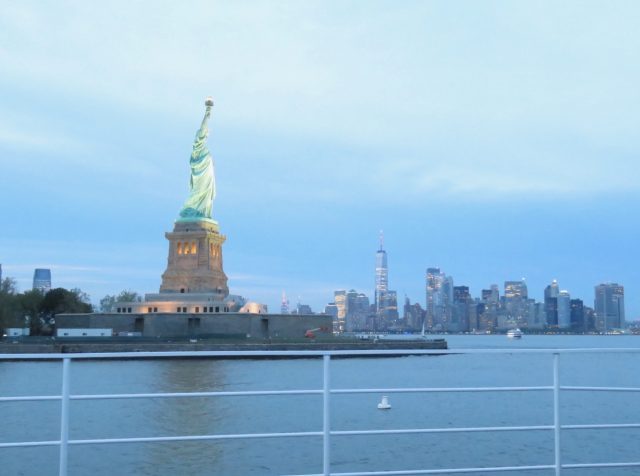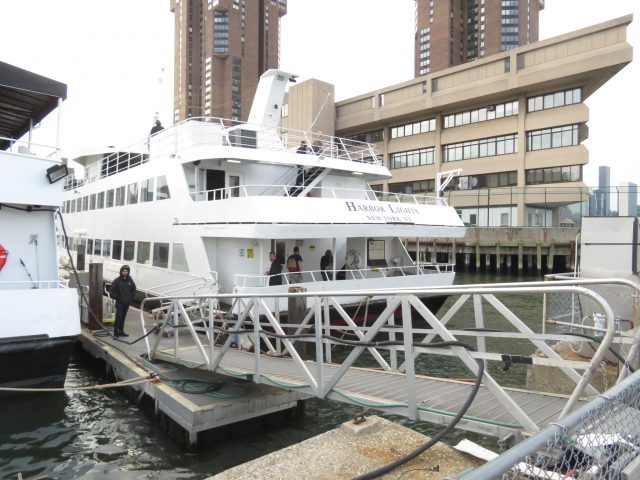
The Statue of Liberty and the Freedom Tower stand tall in background of New York City Players’ The Vessel (photo by twi-ny/mdr)
THE VESSEL
Skyport Marina
2430 FDR Dr. at Twenty-Third St.
June 1-3, $40 (sold out)
Return engagement Wednesday, September 22, $40, 6:00
www.nycplayers.org
“What a symphony for the senses!” one of thirteen performers declares in New York City Players’ The Vessel. The new work, part of the troupe’s Incoming Theater Division (ITD) and LMCC’s residency program, is itself a symphony for the senses. It takes place aboard the Harbor Lights boat, which departs from the Skyport Marina on East Twenty-Third St. and anchors in front of the Statue of Liberty and Ellis Island, with Lower Manhattan and the Freedom Tower visible in the background. The audience is seated in white folding chairs on the upper outdoor deck, where the actors march in, one by one, to stand on two small portable platforms, delivering short eulogies written by current and former members of ITD and then leaving, replaced by the next actor. The monologues are true stories of people the writers have lost, delivered in director and company founder Richard Maxwell’s trademark plainly spoken, carefully modulated yet moving style.
The forty-five-minute play was conceived by Jasmine Pisapia and Katiana Rangel in collaboration with writers and actors Rossana Appleton, Brandon Davis, Jim Fletcher, Linda Mancini, Brian Mendes, Enoch Ntunga, Michael Odom, Yasmin Sanchez, Bréhima Sangaré, Gillian Walsh, Lakpa Bhutia, Nicholas Elliott, Charles Reina, and Bjorn Lee Varella. Ntunga remembers his little brother, Siméon. Walsh says farewell to her cousin Billy. Odom promises his late mother that they will meet again. Pisapia recalls her grandmother Jeannette. Mendes, who played Uncle Jerry in Maxwell’s Isolde, shares stories about his deceased Uncle Jerry, who turns out to be a famous musician.
Occasionally, the previous performer remains on one of the platforms as the next character tells their tale, becoming a silent witness onstage and another audience member. The actors are a diverse cast of ethnicities and genders, sizes and abilities; the parade of different looks and accents takes on a potent meaning with the Statue of Liberty behind them, a symbol of hope for immigrants for nearly 150 years (while also evoking the current border crises), as well as the Freedom Tower, a skyscraper built on the site where more than three thousand people from around the world were murdered on 9/11. It’s also impossible not to think about all those lost to Covid-19 over the past fifteen months.

The Vessel takes place on board Harbor Lights party boat (photo by twi-ny/mdr)
However, Maxwell (The Evening, Samara) never lets the show get overly sentimental or treacly; you might get teary, but there are plenty of laughs and smiles, as this exploration of death is a celebration of life. Birds fly around the ship. The setting sun casts a glow. Noisy party boats pass by. Horns blow and bells ring. Construction can be seen in the distance. The wind whips gently against your face. (Although you are supposed to wear masks, about half of the audience didn’t, whether sipping a drink from the bar or not.) Perhaps most importantly, you are sitting right next to other people, enjoying live performance again; there is no social distancing in this communal outdoor space.
The loveliest moment of the performance occurred during Rangel’s tale about her friend Bob Feldman. As the actor talked about memories and listed things they had shared together — Little Pie coffee, the saxophone, Cuban food, sadness, hugs — the boat began rocking precariously. Pausing to maintain his balance — it frequently looked like he’d fall over as the actor next to him watched closely, amused, perhaps considering reaching out to help him stay up — he somehow managed to sway and waver without losing any of the words, the brief hesitations palpable as the audience rooted for him to finish without surrendering to gravity. “Bob said a few times that during those nights he felt completely alive again,” the eulogy concludes. For three hours on board a boat in New York Harbor, the feeling was mutual.